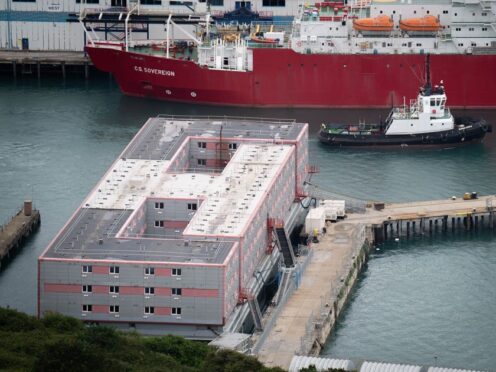
Some 150 migrant hotels will have closed by May, the Home Office has said, after new figures showed £4.3 billion of Britain’s overseas aid budget was spent on hosting refugees and asylum seekers last year.
There are now 20,000 fewer people staying in the accommodation than six months ago, down from more than 56,000 at the end of September, the department announced on Wednesday.
The Home Office spent around £8 million a day last year for tens of thousands of asylum seekers to be put up in hotels while the introduction of alternative housing plans faced a series of setbacks.

Former immigration minister Robert Jenrick announced last October that the Government would be “exiting” 50 hotels by the end of January, with more to follow.
The process will continue “until the last hotel is closed,” Home Secretary James Cleverly said on Wednesday.
“We promised to end the use of asylum hotels and house asylum seekers at more appropriate, cheaper accommodation; we are doing that at a rapid pace,” he said.
“These closures deliver on the Government’s plan to cut the use of hotels in the asylum system and we will keep going until the last hotel is closed.”
The announcement comes shortly after the Independent Commission for Aid Impact (ICAI) said it had found the amount of aid spent on hosting refugees and asylum seekers in the UK soared last year to £4.3 billion.
“Far from reducing as the costs of schemes for Ukrainian and Afghan refugees fell, the amount of aid spent within the UK was driven up further by the Home Office’s spending on hotel accommodation for asylum seekers,” the watchdog said.
Some £2.5 billion of this was spent by the Home Office on asylum accommodation, according to ICAI, raising concerns about value for money.
It comes after Whitehall’s spending watchdog found that Government plans for other accommodation will cost tens of millions of pounds more than using hotels.
The National Audit Office (NAO) said around £1.2 billion is expected to spent on housing migrants in large sites.
By the end of March, the Home Office expected to have spent at least £230 million developing four major projects – the Bibby Stockholm barge in Portland, Dorset, the former RAF bases at Scampton in Lincolnshire and Wethersfield in Essex, and ex-student accommodation in Huddersfield, West Yorkshire.
But so far, just two of the sites are open and were only housing around 900 people by the end of January, according to the watchdog’s findings.
Bibby Stockholm is now housing migrants following a temporary evacuation last year when Legionella bacteria was found on the vessel, and Wethersfield is in use after the local council lost a legal challenge against the Government’s plans for the site.
However, both were accommodating just under half the number of migrants the Home Office expected would be the case at the end of January.
Ministers have also scaled back the number of asylum seekers due to be housed at the former home of the famed 617 “Dambusters” Squadron and the Red Arrows near Lincoln from 2,000 to 800.
But the Home Office has insisted its plan is better value for money for the taxpayer than continuing to use hotels.
Its efforts mean the cost of hotels will fall, the Home Office has promised, adding: “But we have further to go, which is why we are passing the Safety of Rwanda Bill, deterring Channel crossings and get flights off to Rwanda – because it is only when people are discouraged from taking those journeys that we can end asylum hotel use for good.”
Labour’s shadow immigration minister Stephen Kinnock said: “Yet again the Prime Minister and Home Secretary insist on celebrating failure.
“So-called asylum hotels didn’t exist before the Tories lost control of the asylum backlog, and Rishi Sunak promised to end them by the end of 2023. Yet here we are with around 250 still in use come mid-April.
“Rishi Sunak needs to stop the boasts, start stopping the boats, and deliver the firm, fair and well-managed asylum system Labour is committed to delivering.”

Enjoy the convenience of having The Sunday Post delivered as a digital ePaper straight to your smartphone, tablet or computer.
Subscribe for only £5.49 a month and enjoy all the benefits of the printed paper as a digital replica.
Subscribe